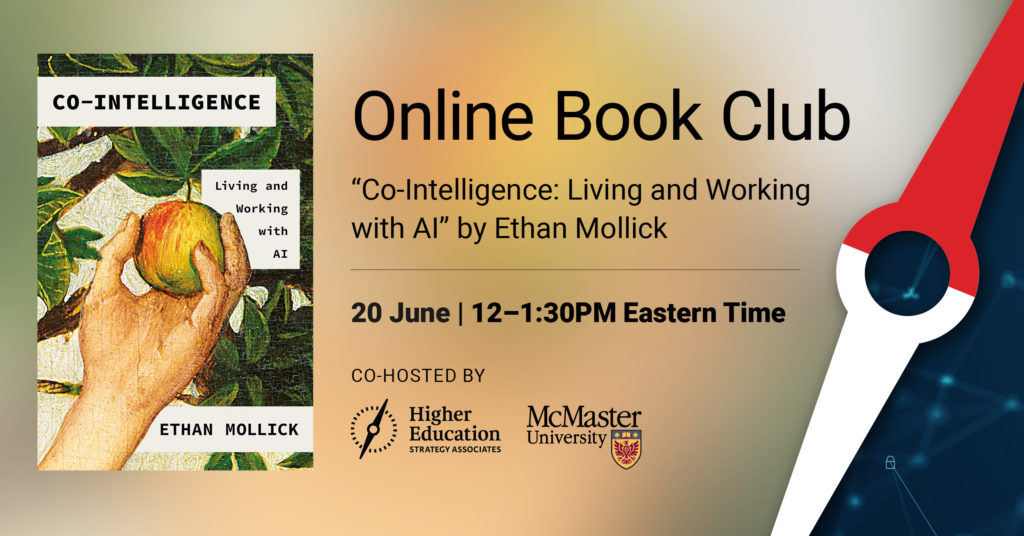Spotlight
Good afternoon all,
This coming week, HESA will be at the QS EduData Summit “AI and Digitally Empowered Education”, in Washington DC. If you are attending the event, come say hi!
Next Roundtable Meeting
Date: Thursday, June 20th, 2024
Time: 12h00-1h30PM ET
Online Book Club: “Co-Intelligence: Living and Working with AI” by Ethan Mollick
Although we officially completed our Winter 2024 series of AI Roundtables last week, we are coming back to you with a special summer event!
Inspired by the discussion at a recent AI Roundtable event, Higher Education Strategy Associates, in partnership with McMaster University, is organizing an online book club for post-secondary educators and administrators across Canada. The book club will focus on Ethan Mollick’s book, “Co-Intelligence: Living and Working with AI”, and aims to facilitate a dialogue on the implications of AI in higher education including teaching and learning and operational activities. Erin Aspenlieder, McMaster University’s Special Advisor to the Provost on Generative AI, will moderate the sessions, facilitating discussions and encouraging participants to share their experiences and reflections.
*Please come prepared to participate actively in the discussions. There will be break-out rooms for everyone to share their opinions on the book. It is strongly encouraged to have read the book prior to participating in the meeting.
Register now (it’s free!) to save your spot!
If you missed last week’s AI Roundtable on Decolonization, you can watch the recording here.

News & Research
Sidorkin, S. National Institute on Artificial Intelligence in Society. May 7th, 2024
The Chief AI Officer of the NIAIS conducted a Survey on Faculty AI Practices and Attitudes in the Spring of 2024 that collected responses from 183 faculty members at Sacramento State. It “reveals both strong faculty interest and significant challenges in integrating artificial intelligence in academic curricula. […] The primary obstacle to more widespread AI adoption in the classroom is not resistance from faculty but rather the complex, multifaceted challenges associated with such an integration, which must be addressed swiftly to ensure that higher education remains relevant and effective in preparing students for the rapidly evolving AI-driven world.” “The limited use is not due to a lack of interest but rather to significant barriers including the absence of easy access to advanced AI technologies, a scarcity of time, and insufficient incentives to undertake comprehensive curriculum revamps.” The report identifies three critical areas “that need urgent attention to facilitate the effective integration of AI into the educational framework”: 1) access to technology; 2) curricular integration; and 3) professional learning.
Coffey, L. Inside Higher Ed. May 21st, 2024
This article shares updates regarding ASU’s partnership with OpenAI. The institution has sought out “proposals from faculty on the best ways to utilize the technology. The proposals fall into three buckets: teaching and learning outcomes; research and the public interest; and improving the university experience, such as better customer service and streamlining work between departments. The university received more than 400 proposals, almost half of them in the first two weeks. The university approved 104 projects for the spring and 114 for this summer.” “While activity from the partnership continues to grow, not everyone is happy about it. Some ASU faculty and students have voiced concerns about the seemingly all-in partnership with the tech behemoth.”
Philips, B. Times Higher Education. April 30th, 2024
“The ‘deep learn’ framework offers a comprehensive approach to enhancing literacy around artificial intelligence and application in higher education settings.” The framework is based on the following components: 1) Discover: encourage exploration; 2) Engage: promote meaningful interaction; 3) Evaluate: foster critical assessment; 4) Probe: encourage in-depth enquiry; 5) Link: connect AI insights to academic concepts; 6) Expand: broaden intellectual horizons; 7) Adapt: cultivate flexibility; 8) Reflect: instill thoughtful consideration; and 9) Navigate: master AI’s capabilities and limitations. Each element has a learning objective and practical exercises for students.
Spezzo, V. and Gokhman, I. Times Higher Education. May 13th, 2024.
The authors of this article reflect on how to integrate GenAI in assignments. They recommend two actionable practices to address the inequality in students’ experiences and knowledge of GenAI: 1) include more detailed instruction and prompt examples for assignments; and 2) create and include a lesson or optional module for teaching students how to use GenAI effectively within courses and disciplines. “By using these practices, the intent is that students coming into a course with little or no prior GenAI experience can be brought up to speed and benefit at near the same level as those who have had a lot of experience using the tools.” “Conducting a start of the semester survey is [also] a good way to identify students who need additional resources and ensure they are directed to access them.”
Farnell, A. Times Higher Education. May 12th, 2024.
In this article, the author makes the point that research methods courses need to catch up with the digital age. “Recently, the quality of search results across all popular engines has fallen, however, and we need to ask whether university research, as currently taught, can survive.” “The spammers can instruct a large language model, such as ChatGPT, to spin a piece of advertising copy into 100,000 articles, each introducing the product under a different subject lead-in, such as cookery, sports, medicine, pet care, and then create 100,000 websites to host it that are indistinguishable to search engines from organic content even though they are poorly written and full of errors. Troll farms can do something similar to promote disinformation.” “Even in university research methods classes, students still get told to use Google or Bing as first port of call. But surely this must end given the increasing uselessness of the results these engines throw up.”
More Information
Want more? Consult HESA’s Observatory on AI Policies in Canadian Post-Secondary Education.
This email was forwarded to you by a colleague? Make sure to subscribe to our AI-focused newsletter so you don’t miss the next ones.



 Tweet this post
Tweet this post
